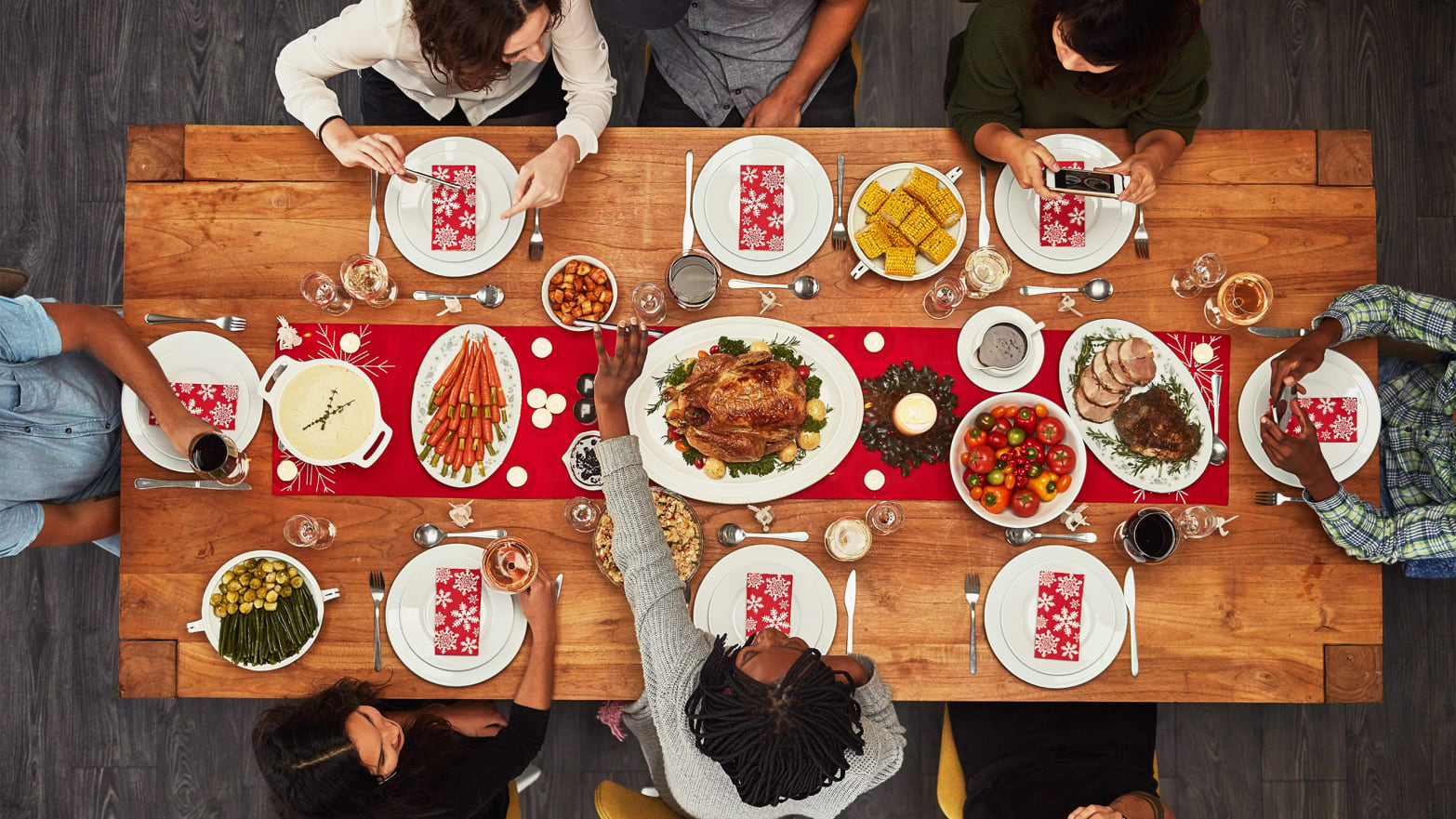Most of us know the basic rules of politesse for Thanksgiving: Show up with more than just your appetite; don’t steal that last scoop of mashed potatoes; avoid asking Aunt Midge how she felt about the midterms.
But beyond the basics, things can get complicated for a guest. Do you bring one bottle of wine or more? Should you pester the host in advance to ask what you should bring? When can you drag a plus-one along?
We reached out to Lizzie Post, the great-great-granddaughter of Emily Post, co-host of the Awesome Etiquette Podcast, and author of books including the forthcoming Higher Etiquette: A Guide to the World of Cannabis, from Dispensaries to Dinner Parties. (“It covers Danksgiving, so there’s that!” laughs Post.) Here are her general tips for being the best guest your host has ever seen this Thanksgiving.
“Always really listen to your host. Sometimes people will offer to bring things, but I really don’t want them to. If the host is really taking care of everything, show up and participate as a guest. If they ask you to contribute, ask, ‘How many people, and should I estimate for leftovers?’ Some Thanksgivings send you home with a little bit of leftovers, others with a dish, and others with no leftovers at all. There’s no one way to be right, but pay attention to what’s happening at your particular Thanksgiving celebration.”
“Try not to spring extra guests on your host. The gold-star polite way to handle bringing someone is to say, ‘Oh my goodness, my friend doesn’t have any Thanksgiving plans at all. If it’s OK with you I’m going to go do Thanksgiving with her. I didn’t just want to invite her to your Thanksgiving without checking with you.’ That allows the host to say, ‘I appreciate the heads-up; have a great time!’ or ‘Oh, my gosh, the more the merrier, there’s plenty of food and space.’”
“You might be asked to bring something that requires the oven, usually for re-heats. (As host, plan time for dishes to be warmed or warn people that dishes need to come piping-hot.) But definitely clear any extras you think about bringing with the host before you bring them. Once a lasagna got brought by a sister-in-law when there was no room for this lasagna anywhere.”
“It’s best not to. If you have to, ask the host first: ‘Would it be all right if I assembled the pies but baked them as we’re all sitting down to dinner?’ The thing you don’t want to do is assume you can. If the host says, ‘Oh, my gosh, we really can’t,’ figure out something else. Chances are, the host is thinking, ‘Oh, my gosh, one more problem.’ If you get the sense at all that your host is overwhelmed, find a plan B.”
“Try, ‘I might do round one without gravy and come back for it for round two!’ if I was really in a pickle. The other thing you can do is take a no-thank you portion: Take a very small amount and have a taste, so you can say you’ve tried it. The really amazing guest is able to find the benevolent truth and say something like, ‘the color was just exquisite!’ We all get caught in these moments. Get as creative as you can. Obviously, you never want to eat something that’s going to make you sick. If you’re a vegetarian you don’t have to say, ‘yes.’ Perhaps, ‘I will look on with jealousy.’”
“If you bring wine as a gift, it can be a single bottle. Make clear to the host, ‘This is for you for another time.’ If you’re also bringing wine for the party, say, ‘These I brought to share.’ Any kind of small gourmet kitchen treat is always a good thing, whether that’s chocolate [or something else]. Small holiday decorations are never bad this time of year, or maybe a cute salt and pepper set or a little dish.”
“How many people are coming to Thanksgiving? Plan on one bottle per every three people, and talk to your host about it. What do they have on hand? Is anyone else also bringing wine? You don’t want to show up with one bottle if you’re the one person bringing wine.”
“That’s one where I would speak up if someone had tasked me with something that was really logistically tough. The last-minute option is that on the way to party, you stop somewhere…or call ahead to the local liquor store and get it ready to go or have it delivered. But if someone is pregnant, for 23 people, that is physically a lot of wine. Ask your host, ‘Could we maybe bring something else instead?’ Stress the fact that you really want to contribute; that always helps.”
“Definitely when the conversation at the table goes to any direction of something unpleasant, whether that’s a political divide or division of opinions on any subject. Some people decide family gatherings are good time to spread negative news. It’s probably not the best time.”
“I’m a big fan of being politely direct. I often will give a big smile and say ‘Oh, I’m not going there tonight, but I really want to hear about that trip you just took’ (or something you know they love). Or, ‘Ohhhh, haha, it was on my goal list not to talk politics tonight, so help me out with that!’ [Try a] ‘Haha, I’m not going to do this!’ tone; nothing says you have to participate in that conversation. Once I saw a tasteless joke told at Thanksgiving and it cleared the room. I felt bad for person who told the joke, but I was also like, well that’s what you get for telling a joke that was funny—or perceived as funny—70 years ago. That was one of those awkward moments where I was like, well, that probably went the way it should have.”

